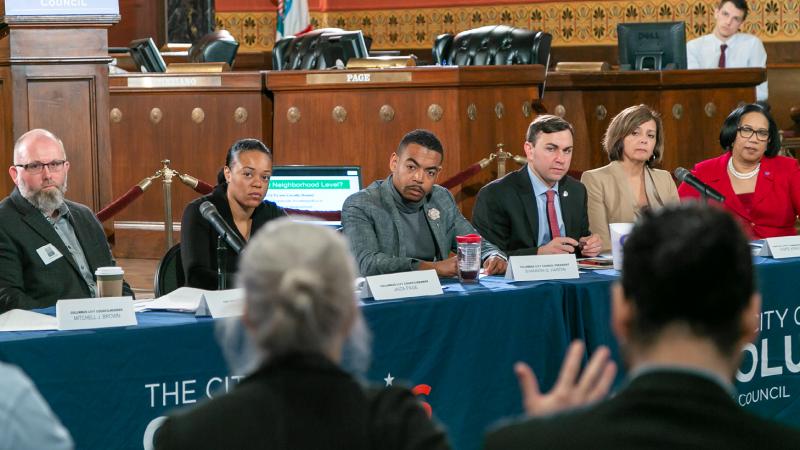Planning Studio Impacts Columbus Land Trust Initiative
"I see an affordable city with dynamic, inclusive growth, mixed income neighborhoods that support family stability and mobility that provides equity and improves the quality of life for all of our residents," stated Columbus Mayor Andrew J. Ginther during his 2019 State of the City address.
While the City of Columbus has been experiencing high population growth that has promoted renewed investment and revitalization in areas of the city, these changes have also displaced low-income residents. Recent studies reveal Columbus is deficient 54,000 units in its affordable housing stock.
Acting on Mayor Ginther’s vision for affordable and sustainable housing in Columbus, Franklin County and Columbus leaders created the Central Ohio Community Land Trust. With a commitment from Columbus officials of $3.8 million in the 2019 capital budget, the Central Ohio Community Improvement Corporation, the non-profit organization that will oversee the Land Trust, will acquire land and build homes for families that struggle with rising house prices in improving neighborhoods.

Supporting this effort were city and regional planning students in the Neighborhood Planning Studio, co-instructed by Associate Professor Bernadette Hanlon and Assistant Professor Jason Reece. These students were tasked by Columbus City Council to research and present proposals for implementing a Community Land Trust (CLT) in the City of Columbus/Franklin County.
“We went to City Hall to present to City Council the research we had completed in our studio, which was awesome because it was real-life solutions to real problems that people have,” said city and regional planning graduate student Amalia Martin.

Gathered in council chambers in City Hall, the students presented their research in three groups that detailed the advantages and disadvantages of three different structures for equitable homeownership: a city-run public sector land trust; a neighborhood based non-project land trust; and a city/county regional land trust.
At the macro level, each group presented case studies on comparable cities and counties, outlining which frameworks worked best and how these land trust entities modified their plans to account for inefficiencies. Locations in which these policy evaluations were conducted included Chicago, Houston, Nashville and Seattle, as well as regional areas such as Boulder County, Colorado and Pima County, Arizona.
Further, each group presented the effectiveness of three common financing models: forgiveness, recapture and retention. The groups also offered guidance on CLT rental models versus CLT home buying models.

Closer to home, viable measures for land trust implementation were focused on the Linden and Franklinton neighborhoods within Columbus—due to their identification as areas of current reinvestment. Presentations explored what model would be most sustainable based on each neighborhood’s geography and demographics.
Following group presentations, the studio as a whole indicated its recommendation for a regionally-scaled community land trust, citing its advantages to involve more stakeholders, serve a larger range of area median income, and draw more potential funding opportunities. “The students really challenged the City Council to approach this issue at a large scale, and ultimately proposed a hybrid city/county model that would allow the CLT to work in a variety of neighborhoods,” said Hanlon. “The presented research really gave energy and direction to those who would be making official and final decisions on this issue.”
“I hope that each and every one of you sees yourself as part of the solution,” commented City Council President Shannon Hardin following the student presentations. “Whatever we do from today on, there was a foundation based on the work you, individually, have done and provided to us, and for that, I am very grateful.”
Reflecting on the experience, city and regional planning graduate student Nick Julian commented: "This studio was an extremely valuable experience—not only to learn more about innovative finance tools such as land trusts, but also in assisting Columbus in providing more affordable housing. The Neighborhood Planning Studio was a unique chance in the Master of City and Regional Planning program to specifically research housing.”


